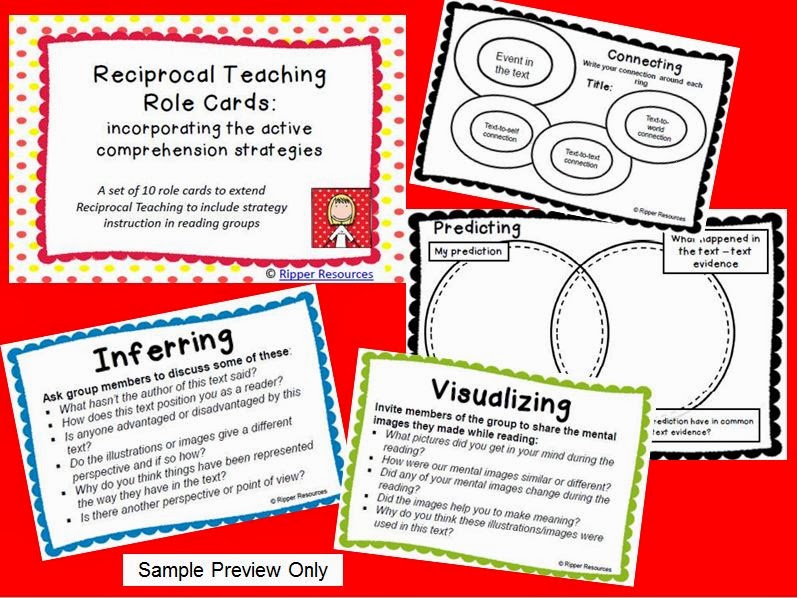Reciprocal Teaching was developed by Palinscar & Brown and an evidence-based approach to improving reading comprehension through small group discussions. Traditionally, Reciprocal Teaching is based on four reading strategies - predicting, clarifying, questioning and summarising (summarizing).
I have extended this to include the active comprehension strategies (e.g. connecting, inferring, visualising/visualizing etc) with ten role cards for reading groups and eight for Math problem solving groups. The set for reading groups includes the following roles: Orientating, Predicting, Reading, Clarifying, Questioning, Visualizing, Summarizing, Connecting, Inferring and Giving Feedback. The set for Reciprocal Teaching in Mathematics includes these roles: Predicting, Clarifying, Questioning, Visualizing, Connecting, Calculating, Summarizing, and Giving Feedback. Both U.S. and Australian spelling are included in each set. I am currently creating interactive notebook sets for each approach as well.
You can read my published research about this approach here or a review of the Reciprocal Teaching research here. Just today I updated my RT in Math cards to include mini graphic organisers for small group problem solving. I updated the reading ones last week as well. Click on the images below to find out more.


http://www.teacherspayteachers.com/Product/Reciprocal-Teaching-in-Math-role-cards-with-mini-graphic-organisers-1068395
" I like the way the information is in an easily read format that they can hold themselves and pair & share. Having the maths comprehension prompts really encourages independent thinking and problem solving. A great idea. I also have the one for the reading group that will compliment what I already do in my guided reading groups." Year 3/4 teacher, Australia.
Check out my latest baby - RT and Math interactive notebook pages - hot off the press!!! Click on the image below to preview this resource.
"Ohhh, I really like this. It is going to make a fantastic addition to our math notebooks. I love making the students accountable for their own learning, so one of my favorite things is that you ask them to rate themselves as a group."
Year 5 teacher, U.S.A.
A friend in the States just sent me these photos of the cards and interactive notebook pages in action:
The feedback I received from my kiddos was pretty unanimous. They all REALLY loved the Reciprocal Teaching cards, because they felt as if they each had an equal "voice" when in their groups. They also liked the question stems on the role cards and one student mentioned that it led him to think of other questions!
Year 5 teacher, Las Vegas.
This is the new set for English (reading groups) with mini graphic organisers:
"I just looked at the new reading ones too. Super cute. I really like that you've added the graphic organizers to both." Year 5 teacher, U.S.A.
"These cards are wonderful. They explicitly invite students to use a rich and meaningful vocabulary when discussing texts and understanding the various comprehension strategies. These cards engage and empower students."
Year 5 teacher, Australia
"I have the candy version of these cards and I love them. We use them at least once a week in our classroom when we are doing our group work. I love it assigns roles to the students with easy to follow directions and questions. It helps guide them to ensure that everyone in the group has a chance for interaction and discussion. Even though I laminated mine, they're becoming so beat up from being used so often. I would love the new set because it looks like it would take a lot less ink print too!" Year 5 teacher, U.S.A.
"I have found a lot of students have trouble especially with inferring and I believe your cards could help with a more visual aspect to learning." Year 5 teacher, Australia
"I especially love these cards. Term 4 of last year I did reading rotations with my 3/4's around a poem and inferring. These cards would have been excellent prompts to help the students to predict what was happening in the poem, look for meanings of words they didn't quite understand/ know. They would have also helped when they were looking for inferences in the poem and asking questions of the poem itself. I like how the cards are made up and could be handed to different groups for different activities on the same poem or different members of the same group. I also like the activity sheets that are done up to go with each card - this will help students to see what is expected of them. Thanks Kylie for such a great resource." Australian teacher.
I am really proud of these new versions. My previous version is my best selling resource in my TPT store. I don't normally do product posts, but I am so excited by these updated versions, I just wanted to share :)
I will be posting more about the RT approach in the coming weeks.
Please comment below if you have used RT in your classroom and if you have had success with this approach. I will be sharing links to freebies to support this approach in the near future.







I did use RT in some of my small reading groups. But I have not tried it in math. I will need to look into this more. Thanks for peeking my interest :)
ReplyDeleteEm
Curious Firsties
You are more than welcome Em. I find it works really well for small group problem solving sessions. Kylie
ReplyDelete